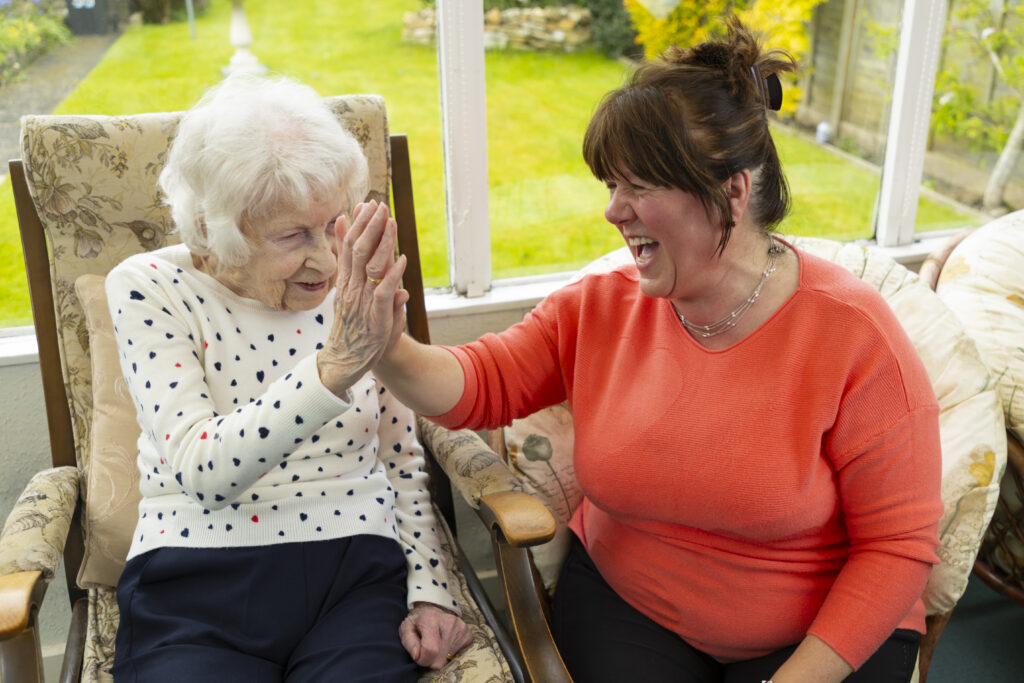Motor Neurone Disease can develop at any age. It can have many symptoms, for instance, loss of strength, difficulty swallowing, trouble with speech and mobility issues.
We know that the impact of motor neurone disease on you and your loved ones can be highly emotional. As a result of its varied effects and progressive nature, your needs are likely to change over time. Through our specialist motor neurone disease care and support services, we provide both physical and emotional support, tailoring your care completely to you to help you live life to the fullest.
Our experienced specialists offer flexible support through live-in care, home care, and our care and nursing homes, adapting to your changing needs and circumstances. Working closely with your medical team, your personalised plan ensures you receive the correct treatment while being able to maintain a full and active life.
If complications arise or your care needs become more complex, we are fully equipped to adjust our services to meet your evolving requirements.

What is Motor Neurone Disease care?
Motor neurone disease care provides personalised support for people living with motor neurone disease, a progressive condition that affects movement, strength, and daily function. Because the impact of motor neurone disease varies from person to person, the level of support required is unique to each individual.
Our motor neurone disease care and support services are designed to help individuals maintain independence, confidence, and quality of life. Depending on your needs, care may include 24-hour live-in care for complex or ongoing requirements, regular home care visits for daily support, or tailored care within one of our care and nursing homes.
From physical support and personal care to emotional support and companionship, we adapt our approach to ensure safety, dignity, and continuity at every stage of the condition. Working closely with your medical team, we tailor your care plan to meet your evolving needs and help you live as fully and actively as possible.

Our Motor Neurone Disease support services
Our motor neurone disease support services are designed to provide the best care for people living with motor neurone disease, built entirely around each person’s unique needs and goals. We create bespoke care plans that focus on maintaining independence, quality of life, and personal wellbeing, ensuring you or your loved one receives the right level of support at every stage of the condition.





Specialist Motor Neurone Disease care
Our specialist motor neurone disease care supports people with a wide range of complex needs, including progressive loss of mobility, speech, and swallowing, as well as respiratory complications and fatigue. Every care plan is tailored to the individual’s physical, cognitive, and emotional needs to ensure the best possible quality of life, independence, and comfort.
Local Authority and NHS Partnerships
We work closely with local authorities and the NHS to ensure people living with motor neurone disease receive the right level of support at home or in a care setting. We partner with multiple local authorities and NHS trusts across England, providing fully managed, personalised care packages. These partnerships ensure continuity of care, allowing individuals to access expert support in the community and benefit from coordinated treatment, rehabilitation, and ongoing assistance.
Nursing Care
We provide expert nursing care as part of our specialist motor neurone disease services, supporting clients with complex medical, personal, and technical needs. Our team delivers personalised care including symptom management, medication administration, clinical monitoring, assistance with daily living, and emotional support, helping clients to live safely, comfortably, and as independently as possible.

Meet Cher – Our Clinical Lead
Cher has enjoyed a long and varied career in health and social care across Europe and the UK. A registered nurse, she set up her own domiciliary care service in Monaco, later expanding it into France, supporting people with complex care needs. Before joining Agincare in April 2023, Cher worked for the DWP in disability analysis and as a Mental Function Champion. Cher oversees the clinical aspects of our live-in care service, including quality assurance, technical competency, and training.

Registered Nurse care and Nursing Associates
Our specialist motor neurone disease services are supported by highly trained registered nurses and nursing associates, providing expert care for individuals with complex needs.
Registered nurses deliver personalised clinical care, including symptom management, medication administration, and coordination with other healthcare professionals. They ensure that each person’s medical and wellbeing needs are met safely and effectively, supporting comfort, dignity, and quality of life.
Nursing associates work alongside registered nurses to provide day-to-day support, assist with personal care, and help implement personalised care plans. Their role bridges clinical care and hands-on support, helping individuals maintain dignity, comfort, and consistency in their care.
Together, our nursing teams provide a seamless approach to motor neurone disease care, ensuring that both medical and personal needs are met with professionalism, compassion, and expertise.

Costs of Motor Neurone Disease care
The cost of motor neurone disease care varies depending on the type of service, level of need, and complexity of support required. Understanding motor neurone disease support costs can help you plan and choose the right care for you or your loved one.
Our live‑in care for motor neurone disease starts from £1,135 per week, with transparent pricing and tailored quotes based on individual needs. Our experienced care advisors can guide you on paying for motor neurone disease care and help you explore funding options to ensure the right support is in place.
Already receiving motor neurone disease care and support? You could be paying more than you need to. Find out quickly with our Cost Savings Calculator, a simple tool that helps you compare your current care costs and see how much you could save with Agincare.

CQC information
When you are looking for information, be sure to visit the Care Quality Commission’s website. The CQC monitors and inspects care services and publish what they find to help you find the best care.
Funding
At Agincare, we work closely with individuals, local authorities, case managers and solicitors to ensure you receive the right funding and support for your needs. Our experienced team can guide you through available options, including local authority funding, NHS continuing healthcare and privately funded care, helping you make informed decisions with confidence and transparency.
Why choose Agincare’s Motor Neurone Disease services?
Our motor neurone disease services are trusted by thousands of families, local authorities across the country, and the NHS to deliver reliable, high-quality care. Our bespoke, fully-managed service is regulated by the CQC and rated ‘Good’.

One of the largest independent care providers in England, with decades of specialist care experience

Family-owned care provider established in 1986

Rated excellent on Trustpilot

Fully managed care provider

24/7 updates on your package of care via our app

Fully trained live-in care workers directly employed by us

Immediate and emergency starts available

Tailored support for varying levels of need, including specialist nurse-led care for complex conditions

Dedicated care supervisor to oversee your care

No lengthy contracts or exit fees – flexible, transparent support

Offer a range of services including live-in care, home care and care homes

All of our care workers are English-speaking and enhanced DBS checked
Reviews of our services




How to arrange care
Getting started with Motor Neurone Disease care is simple and obligation‑free. Our step‑by‑step process makes arranging care straightforward and stress‑free:
Our expert team is here to guide you through every step with compassion and clarity, and there is no obligation to proceed.

Frequently asked questions
Motor neurone disease is an uncommon condition that affects the brain and nerves. It causes weakness that gets worse over time. There’s no cure for motor neurone disease, but there are treatments to help reduce the impact it has on a person’s daily life. Some people live with the condition for many years.
Symptoms of motor neurone disease happen gradually and may not be obvious at first.
Early symptoms can include:
Weakness in your ankle or leg – you might trip, or find it harder to climb stairs
Slurred speech, which may develop into difficulty swallowing some foods
A weak grip – you might drop things, or find it hard to open jars or do up buttons
Muscle cramps and twitches
Weight loss – your arms or leg muscles may have become thinner over time
Difficulty stopping yourself from crying or laughing in inappropriate situations
All our care workers complete the nationally recognised care certificate. Specific client needs-led training is taught by our training partner Training Now and healthcare professionals.
Motor neurone disease currently has no cure, but there are treatments available to alleviate its impact on daily life. While some individuals live with the condition for an extended period, it often reduces life expectancy and ultimately leads to death.
The specific reason for motor neurone disease is unclear, and you can’t get it from someone else. It’s generally thought to result from a mix of environmental, lifestyle, and genetic factors. In many cases, Motor neurone disease develops without a clear and apparent cause.


